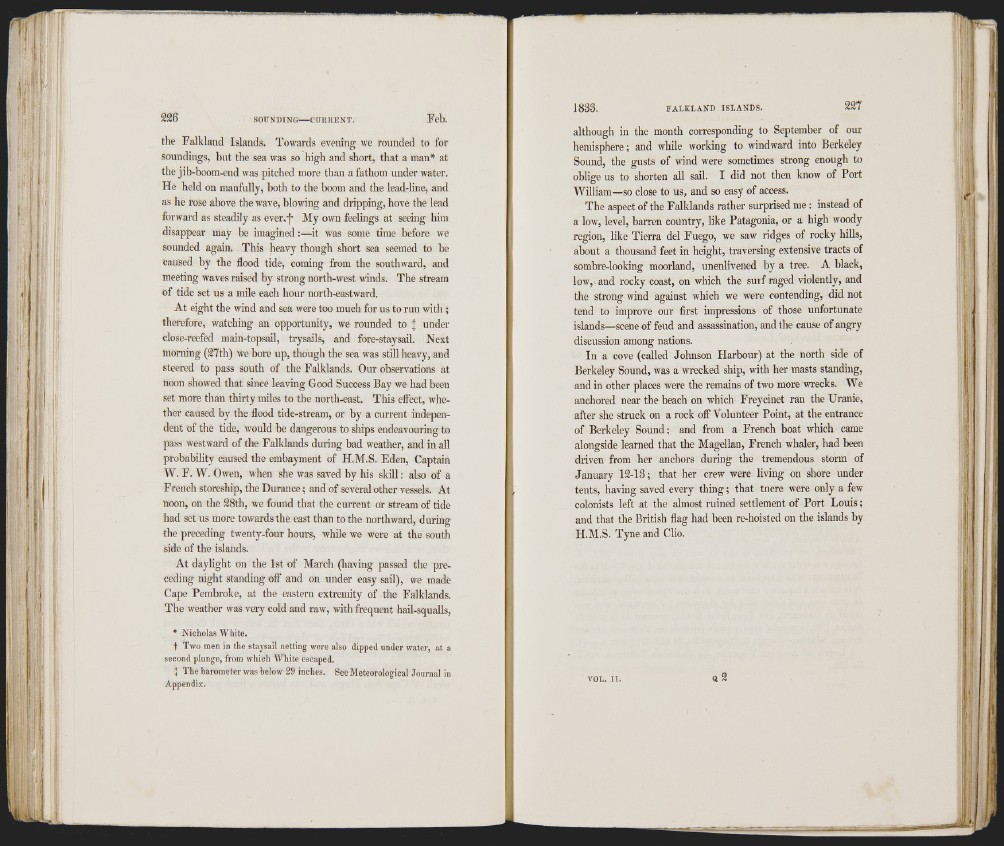
, . ,in
it'
iH
il
I I
SOUNDING CUIUIENT. Feb.
the Falkland Islands. Towards evening we rounded to for
soundings, but the sea was so high and short, that a man* at
the jih-boom-end was pitched more than a fathom under water.
He held on manfully, both to the boom and the lead-line, and
as he rose above the wave, blowing and dripping, hove the lead
forward as steadily as ever.-f My own feelings at seeing him
disappear may be imagined :—it was some time before we
sounded again. This heavy though short sea seemed to he
caused by the flood tide, coming from the southward, and
meeting waves raised by strong north-west winds. The stream
of tide set us a mile each hour north-eastward.
At eight the wind and sea were too much for us to run with ;
therefore, watching an opportunity, we rounded to ] under
close-reefed main-topsail, trysails, and fore-staysail. Next
morning (27th) we bore up, though the sea was still heavy, and
steered to pass south of the Falklands. Our observations at
noon showed that since leaving Good Success Bay we had been
set more than thirty miles to the north-east. This effect, whether
caused by the flood tide-stream, or by a current independent
of the tide, would be dangerous to ships endeavouring to
pass westward of the Falklands during bad weather, and in all
probability caused the emhayment of H.M.S. Eden, Captain
W. F. W. Owen, when she was saved by his skill: also of a
French storeship, the Durance; and of several other vessels. At
noon, on the 28th, we found that the current or stream of tide
had set us more towards the east than to the northward, during
the preceding twenty-four hours, while we were at the south
side of the islands.
At daylight on the 1st of March (having passed the preceding
night standing off and on under easy sail), we made
Cape Pembroke, at the eastern extremity of the Falklands.
The weather was very cold and raw, with frequent hail-squalls,
* Nicholas White.
t Two men in the staysail netting- were also dipped under water, at a
second plunge, from which White escaped.
} The barometer was below 29 inches. See Meteorological Journal in
Appendix.
ill
although in the month corresponding to September of our
hemisphere; and while working to windward into Berkeley
Sound, the gusts of wind were sometimes strong enough to
oblige us to shorten all sail. I did not then know of Port
William—so close to us, and so easy of access.
The aspect of the Falklands rather surprised me : instead of
a low, level, barren country, like Patagonia, or a high woody
region, like Tierra del Fuego, we saw ridges of rocky hills,
about a thousand feet in height, traversing extensive tracts of
sombre-looking moorland, unenlivened by a tree. A black,
low,- and rocky coast, on which the surf raged violently, and
the strong wind against which we were contending, did not
tend to improve our first impressions of those unfortunate
islands—scene of feud and assassination, and the cause of angry
discussion among nations.
In a cove (called Johnson Harbour) at the north side of
Berkeley Sound, was a wrecked ship, with her masts standing,
and in other places were the remains of two more wrecks. We
anchored near the beach on which Freycinet ran the Uranie,
after she struck on a rock off Volunteer Point, at the entrance
of Berkeley Sound; and from a French boat which came
alongside learned that the Magellan, French whaler, had been
driven from her anchors during the tremendous storm of
January 12-13; that her crew were living on shore under
tents, having saved every thing; that tnere were only a few
colonists left at the almost ruined settlement of Port Louis;
and that the British flag had been re-hoisted on the islands by
H.M.S. Tyne and Clio.
Í ' 1
•1
: it
•;lji h
VOL. II .